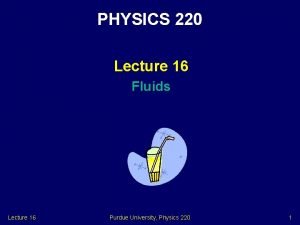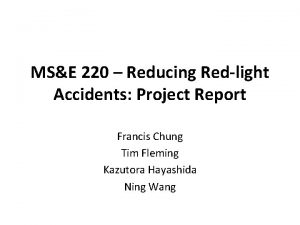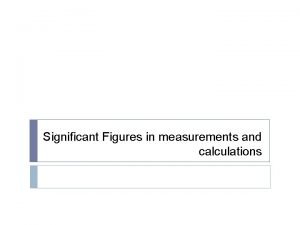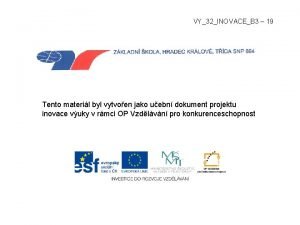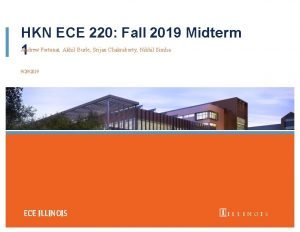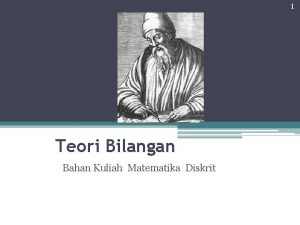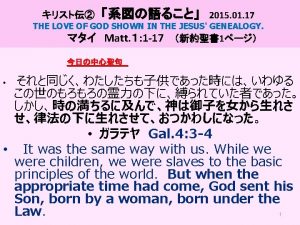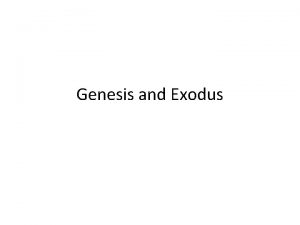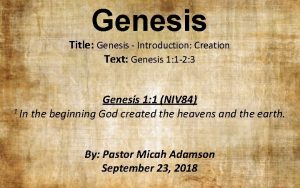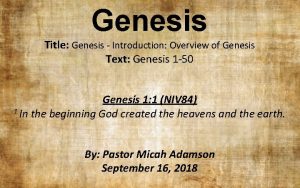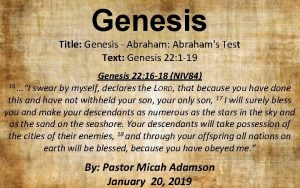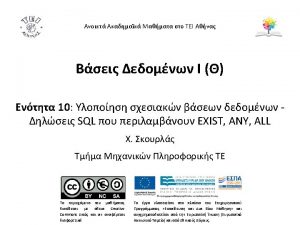PAGE 220 Genesis 3 15 The Protoevangelium The

























- Slides: 25

PAGE 220

Genesis 3: 15 – The “Proto-evangelium” • The meaning of the word – • Proto – first • Evangelium – gospel • The nature of the proto-evangelium – 1. God is the initiator of the enmity between the two seeds. 2. The reference appears to speak of Christ’s victory over Satan at the cross. § § At the cross, Satan would cause Christ to suffer (“bruise his heal”). Satan would be dealt a death blow (“crush his head”.

The “seed” of Galatians 3: 16 • “In the minds of most, ‘Abraham’s seed’ is synonymous with “the Jews. ” Paul contended, however, that the promise was made not to seeds, but to one seed. And that one Seed is Jesus Christ. The promises of God to bless the world come not through the Jewish nation, but through Jesus; not through any national entity, but through Jesus Christ exclusively to all people, in all places. ” Courson, J. (2003). Jon Courson's Application Commentary (1181). Nashville, TN: Thomas Nelson.

"The Order of Salvation“ (“Ordo Salutis”) • 1. Election (God's choice of people to be saved before the creation of the world. ) • 2. The gospel call (proclaiming the message of the gospel) • 3. Regeneration (being born again) • 4. Conversion (faith and repentance) • 5. Justification (right legal standing) • 6. Adoption (membership in God's family) • 7. Sanctification (right conduct of life) • 8. Perseverance (remaining a Christian) • 9. Death (going to be with the Lord) • 10. Glorification (receiving a resurrection body)

Thomas Aquinas (c. 12251274) Aquinas taught: • God infuses grace into the human soul - the Christian now has faith and, with it, the ability to do good - this step is entirely God’s work and is not done by man, however, faith alone is not enough for salvation. 2. With man’s free will restored, man must now do his best to do good works in order to have a “faith formed by charity”; and then 3. God then judges and awards eternal life on the basis of these good works.

Definition of “repentance” • Repentance is a heartfelt sorrow for sin, a renouncing of it, and a sincere commitment to forsake it and walk in obedience to Christ.

Aspects of Repentance • Repentance, like faith, is: 1. an intellectual understanding (that sin is wrong), 2. an emotional approval of the teachings of Scripture regarding sin (a sorrow for sin and a hatred of it), 3. and a personal decision to turn from it (a renouncing of sin and a decision of the will to forsake it and lead a life of obedience to Christ instead).

• Good works – the cross = Jesus is unnecessary • Good works + the cross = Jesus is insufficient • The cross – good works = Jesus alone is sufficient

Three theories on election: 1. God predestines us to be saved by looking into the future and seeing who will believe in Christ and who will not. 2. God predestinates and we are not involved at all. 3. God predestinates but we also freely choose Christ. (The paradox of election and freewill.

John Calvin (1509 -1564)

TULIP (Five articles of Calvinism) • T -- total depravity. This doesn't mean people are as bad as they can be. It means that sin is in every part of one's being, including the mind and will, so that a man cannot save himself. • U -- unconditional election. God chooses to save people unconditionally; that is, they are not chosen on the basis of their own merit. • L -- limited atonement. The sacrifice of Christ on the cross was for the purpose of saving the elect.

TULIP (continued) • I -- irresistible grace. When God has chosen to save someone, He will. • P -- perseverance of the saints. Those people God chooses cannot lose their salvation; they will continue to believe. If they fall away, it will be only for a time.

Jacob Arminius (1559 -1609)

The Reformed faith (the teaching of Calvin) would face its first major doctrinal opposition in Holland. Jacob Arminius (1559 -1609) attempted to modify Calvinism.

Jacob Arminius (1559 -1609) Jacob Arminius was a Dutch pastor born in 1559, five years before the death of John Calvin.

Arminius argued that: • God’s grace enabled man to initiate salvation by cooperating with God by faith. (He elevated man’s part. ) • Christ died for all but his death was only efficient for the elect. • man could resist God’s grace. • man could lose his salvation.

The Synod of Dort (1618/19)

The Synod of Dort (1618/19) The conclusion of the Synod of Dort: They rejected Arminius’ views, and set forth the Reformed doctrine on each point, namely: The Five Points of Calvinism (TULIP)

“R. O. S. E. S. ” • R = Radical depravity (Instead of total depravity) We still are in God’s image, though fallen. • O=overcoming grace (instead of irresistible grace) – Grace can be resisted. • S= Sovereign election (instead of unconditional election) – Allows for a response by the person in response to what Christ has done.

“R. O. S. E. S. ” (cont. ) • E= Eternal life (instead of perseverance of the saints) – allow for backsliding, not a linear progression of growth. • S= singular redemption (instead of limited atonement) – Jesus’ death is sufficient to save everyone but is efficient only to those who by their free will respond to God’s grace.

The Tabernacle

The Temple

On the top of the Ark of the Covenant was the “mercy seat” or “atonement cover”.

Once a year, the High Priest would sprinkle blood on this mercy seat. The tablets of stone, inside the Ark represented God’s law. When this blood was sprinkled it symbolized a “covering” over the Israelites'’ disobedience to God.

The final and permanent atonement was accomplished by the sacrifice of the ultimate “lamb of God” at the crucifixion. Human – Able to die Deity – Sinless THE PERFECT SACRIFICE!
 Protoevangelium definition
Protoevangelium definition Header in apa format
Header in apa format Compsci 220
Compsci 220 Purdue physics 220
Purdue physics 220 Stężenie procentowe wzór
Stężenie procentowe wzór Cec 220
Cec 220 Ms&e 220
Ms&e 220 Mhr=220-17
Mhr=220-17 Mhr=220-18
Mhr=220-18 220 mhz transverter
220 mhz transverter Sta 220
Sta 220 It 220
It 220 Cantor paradoksu
Cantor paradoksu Ruler significant figures
Ruler significant figures What is maximum heart rate
What is maximum heart rate Dopamine dose calculation
Dopamine dose calculation Scbwa
Scbwa Ece252
Ece252 Smtp 220
Smtp 220 Jak zapojit vidlici 230v
Jak zapojit vidlici 230v Uiuc ece 220
Uiuc ece 220 Pbb dari 220 dan 1400
Pbb dari 220 dan 1400 Mhr=220-16
Mhr=220-16 Cps 220
Cps 220 160 rounded to the nearest hundred
160 rounded to the nearest hundred What is z a/2 in statistics
What is z a/2 in statistics



